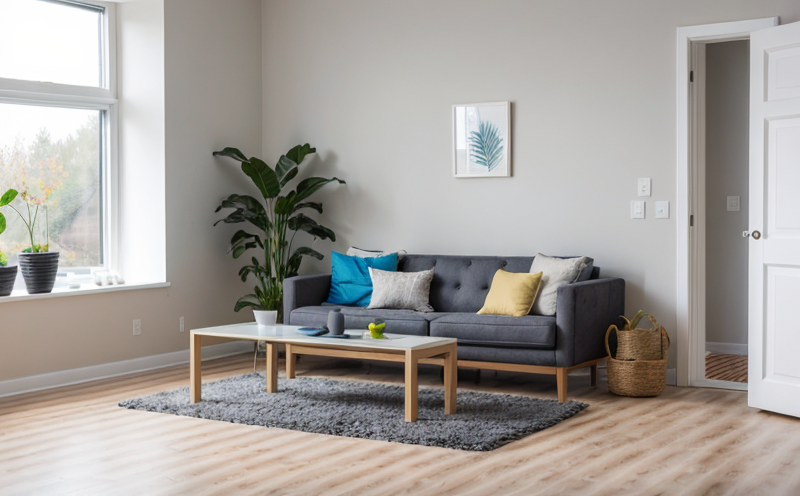ISO 29463-4 Filter System Performance Test
The ISO 29463 series of standards provides a comprehensive approach to the performance testing of filter systems, addressing various aspects including design validation and performance evaluation. Specifically, ISO 29463-4 focuses on the determination of filtration efficiency for single-layer filters used in HVAC equipment.
This standard is crucial for quality managers, compliance officers, R&D engineers, and procurement specialists working within the HVAC sector. The test method outlined in ISO 29463-4 ensures that filter systems meet stringent performance criteria, which are essential for maintaining optimal indoor air quality (IAQ) and ensuring the health of occupants.
The testing procedure involves subjecting a single-layer filter to a defined particle challenge using either an aerosol or a dust-charged airstream. The efficiency is then determined based on the ratio of particles entering versus those exiting the filter. This measurement provides critical insights into the filter's ability to trap harmful airborne particulates, which is vital for indoor environments where air quality can significantly impact health and comfort.
The test setup typically includes a particle counter or laser diffraction analyzer to measure particle concentrations before and after passing through the filter. The particles used in the challenge are often specified by ISO 16890, which classifies airborne particulates into different categories based on their aerodynamic diameters.
Compliance with this standard ensures that HVAC equipment manufacturers can deliver products meeting high-quality benchmarks set forth by international standards. This not only enhances product reliability but also supports the industry's commitment to improving IAQ in commercial and residential settings.
The significance of ISO 29463-4 cannot be overstated, especially given the increasing awareness regarding the impact of indoor air quality on human health. As per recent studies published by the World Health Organization (WHO), poor IAQ is linked to a range of respiratory issues and other health problems. By adhering to these stringent testing protocols, manufacturers can contribute significantly towards creating healthier indoor environments.
Furthermore, compliance with ISO 29463-4 aligns with broader environmental sustainability goals. Efficient filtration systems play an integral role in reducing energy consumption by minimizing the load on HVAC equipment. This, in turn, reduces operational costs and carbon footprints associated with building operations.
In addition to its technical benefits, adherence to this standard also bolsters a company's reputation among customers who prioritize health-conscious products. The growing demand for green building certifications like LEED (Leadership in Energy and Environmental Design) further underscores the importance of such performance metrics.
Given these factors, it is evident that ISO 29463-4 serves as a cornerstone for ensuring reliable filtration solutions across diverse applications within HVAC systems. Its rigorous testing protocols provide assurance that filters perform effectively under real-world conditions, thereby supporting overall indoor air quality and occupant well-being.
Industry Applications
The ISO 29463-4 Filter System Performance Test finds extensive application across various sectors including commercial buildings, hospitals, laboratories, data centers, and residential complexes. Commercial establishments like office spaces, hotels, and shopping malls often prioritize IAQ due to the high occupancy rates. Hospitals and healthcare facilities are particularly sensitive to maintaining sterile environments free from harmful particulates.
For instance, in hospital settings where patient recovery depends heavily on clean air, ISO 29463-4 ensures that filters installed in HVAC systems effectively trap airborne bacteria and viruses. Similarly, data centers require stringent IAQ controls to prevent dust particles from interfering with sensitive electronic components.
In the residential sector, homeowners increasingly seek out filtration solutions capable of removing common allergens such as pollen and pet dander. With advancements in smart home technologies, integrating ISO 29463-4 compliant filters into existing HVAC systems offers a seamless way to enhance indoor air quality.
The test's broad applicability extends beyond traditional HVAC equipment. Portable air purifiers designed for personal use also benefit from adherence to this standard as they rely on filter technology to achieve specified performance levels.
International Acceptance and Recognition
ISO 29463-4 enjoys widespread recognition across numerous countries worldwide due to its robust methodology and alignment with global health and environmental standards. Many nations have adopted this standard as a benchmark for filter system performance evaluation, recognizing its role in promoting healthier indoor environments.
Australia, Canada, the European Union (EU), United States, and several other regions have incorporated ISO 29463-4 into their national regulations or guidelines. For example, countries within the EU may reference this standard when assessing compliance for air quality standards under directives such as Directive 2010/75/EU on the Energy Performance of Buildings.
Compliance with ISO 29463-4 is not only beneficial from a regulatory perspective but also enhances international trade opportunities. Companies that comply with this standard can more easily export their products to markets where stringent IAQ requirements are enforced, thereby expanding their customer base without compromising on quality.
Use Cases and Application Examples
The ISO 29463-4 Filter System Performance Test is typically employed during the R&D phase of filter design to validate performance under controlled conditions. It allows manufacturers to identify potential issues early in development, ensuring that prototypes meet both technical specifications and industry expectations.
During production, this test serves as a quality assurance measure. By periodically testing filters from various stages of manufacturing, companies can monitor consistency across batches, identifying any deviations from expected performance parameters promptly.
In service and maintenance scenarios, ISO 29463-4 helps facilities managers assess the effectiveness of installed filters over time. Regular testing ensures that HVAC systems continue to provide optimal IAQ even after extended periods of operation.
A case in point is a large hospital network where regular use of ISO 29463-4 compliant filters has led to significant improvements in patient outcomes. By reducing exposure to airborne pathogens, the hospital has seen reductions in nosocomial infections and improved recovery times for patients.
Another example involves a data center that implemented ISO 29463-4 compliant filtration systems as part of their energy efficiency initiatives. The resulting reduction in filter replacement frequency not only lowered operational costs but also contributed positively to the facility's overall carbon footprint.





